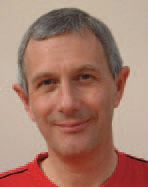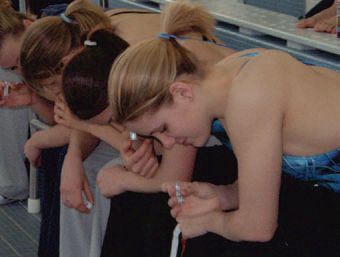
Physiology News Magazine
Training and competition stress: effects on immune function and health
Mike Gleeson continues our series of articles on exercise physiology in the run up to the Olympics by considering the health implications of hard training by endurance athletes
Features
Training and competition stress: effects on immune function and health
Mike Gleeson continues our series of articles on exercise physiology in the run up to the Olympics by considering the health implications of hard training by endurance athletes
Features
Mike Gleeson
School of Sport and Exercise Sciences, Loughborough University, Loughborough, UK
https://doi.org/10.36866/pn.56.9

Athletes dread the thought of catching a cold or the ’flu. Infections can interfere with training, impair performance and even prevent an athlete from competing. Unfortunately, athletes engaged in heavy training programmes, particularly those involved in endurance events, appear to be more susceptible than normal to infection. For example, several epidemiological studies in the 1990s indicated that sore throats and flu-like symptoms are more common in endurance athletes than in the general population. The immune system protects the body against infection but the functioning of the immune system is affected by stress and there is some evidence that the increased susceptibility to infection in athletes actually arises from a depression of immune function. Although impairment of immune function sometimes leads to the reactivation of a latent virus, the development of a new infection generally requires exposure to a pathogen, and there are many training and competitive situations in which the athlete’s exposure to pathogens is increased.
Heavy prolonged exertion is associated with increased levels of stress hormones (e.g. adrenaline and cortisol) and cytokines (e.g. interleukins 6 and 10) which inhibit some aspects of immune function. Several changes during early recovery from exercise would appear to weaken the potential immune response to pathogens and although the clinical significance of these changes has not been established, it has been suggested that the postexercise period may provide an ‘open window’ for infection representing the most vulnerable time for athletes in terms of their susceptibility to infection. The impairment of immune function following a prolonged bout of exercise is associated with decreased expression of the Toll-like receptors on monocytes that detect pathogens, decreased killing capacity of neutrophils and natural killer cells, decreased cytokine production by type 1 T-helper cells together with the disappearance of these lymphocytes from the circulation, decreased lymphocyte proliferative responses to antigens and increased apoptosis under the influence of cortisol. The secretion of cortisol during exercise is stimulated by muscle-derived interleukin-6 (IL-6). Studies from Bente Pedersen’s group in Copenhagen indicate that the release of IL-6 from contracting muscle can be attenuated by carbohydrate ingestion during exercise and by long-term antioxidant supplementation. This group has argued that this, however, may be a two-edged sword, as IL-6 has several metabolic effects and shared mechanisms exist regarding immune impairment and training adaptation. The concern for athletes is that although these nutritional interventions may reduce their risk of infection, another effect may be to limit their hard-earned adaptation to training.

Both heavy exercise and nutrition exert separate influences on immune function; these influences appear to be greater when exercise stress and poor nutrition are present together. Exercise training increases the body’s requirement for most nutrients and, in many cases, these increased needs are met by increased food consumption, though for some athletes this may conflict with their weight restriction goals. Athletes can help themselves by eating a well balanced diet that includes adequate energy, carbohydrate, protein and micronutrients. Ensuring sufficient carbohydrate intake to restore glycogen stores on a daily basis will minimise the stress hormone response to training and delay the onset of symptoms associated with overreaching.
Hard exercise is associated with an increased level of free radicals because of the high rate of oxygen consumption. The superoxide radical is formed during the passage of electrons through the mitochondrial respiratory chain. Free radicals are also formed in the blood and tissues by activated phagocytic white blood cells. Finally, the reperfusion of tissues such as the gut after exercise may also give rise to increased free radical production through the actions of endothelial xanthine oxidase. Some immune cell functions can be impaired by an excess of free radicals and so this is another possible mechanism of exerciseinduced immune function depression. In Athens, the high level of air pollutants (particularly ozone) is likely to exacerbate oxidative stress and may also impair lung function. This, of course, affects athletes more than sedentary people because of the high level of pollutant exposure with high rates of ventilation during exercise (as high as 200 litres per minute in very fit individuals). Obviously, the longer the event, the greater the exposure to ozone, and asthmatic athletes such as Paula Radcliffe will be more susceptible to airborne pollutants. To protect against the harmful effects of oxidative stress, the body contains numerous anti-oxidant compounds (e.g. glutathione) and enzymes (e.g. superoxide dismutase), along with the ability to absorb several dietary anti-oxidant compounds, such as vitamins C and E, that are involved in the quenching of free radicals. Supplementation with vitamins C and E appears to alleviate the effects of ozone on exercise performance and, although there is some controversy regarding the effects of anti-oxidant vitamin supplements on immune function and resistance to infections, a handful of studies have reported fewer infectious episodes in athletes supplemented with vitamin C prior to long distance foot races.

The other big environmental problem in Athens is, of course, the heat. Exercising in these hot environmental temperatures is associated with an increased stress hormone response and greater perception of effort. The general consensus is that exhaustive physical activity and severe environmental stress generally have at least an additive effect on stress responses and immunodepression. Limiting initial exposure when training or competing in adverse environmental conditions, and acclimating or acclimatising where appropriate, will reduce the effects of environmental extremes on the stress hormone response to exercise. This should be beneficial for the maintenance of immunocompetence.
In addition to physical stress, there is the added psychological stress of competition, team and commercial pressures, international travel, selection pressures, funding pressures and other major life events. Chronic psychological stress is also known to depress immune function. The aim of the coach, working with a sport psychologist, should be to anticipate these additional stressors and, through appropriate evaluation and planning, eliminate or minimise as far as possible their impact upon the athlete. Sleep disturbance is not uncommon in athletes who are training hard, and it is important to realise that chronic lack of sleep is itself associated with impaired immunity. Athletes should be encouraged to get adequate sleep and 6 hours sleep per night is probably the minimum required by most. Other behavioural lifestyle changes, such as good hygiene practice, may limit transmission of contagious illnesses by reducing exposure to common sources of infection including airborne pathogens and physical contact with infected individuals. Medical support, including regular check ups, appropriate immunisation and prophylactics, may be particularly important for athletes who are at high risk of succumbing to recurrent infection.
Finally, do not take this as a message that exercise is bad for you! Of course, it is well established that regular moderate exercise is good for health and is associated with reduced incidence of both cardiovascular and metabolic diseases. Even immune function may benefit from regular exercise, provided that you don’t over do it. A recent study found that the incidence of respiratory infections was 30% lower in people who exercised moderately for 1-2 hours per day compared with those with a coach potato lifestyle! To have any chance of winning an Olympic medal, though, athletes have to train much longer and harder than this.
